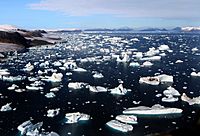Cape York (Greenland) facts for kids
Quick facts for kids Cape York |
|
|---|---|
| Perlernerit | |

|
|
| Location | Qaasuitsup, Greenland |
| Coordinates | 75°54′38.3″N 66°24′44.6″W / 75.910639°N 66.412389°W |
| Offshore water bodies | Baffin Bay |
| Area | Arctic |
Cape York is a large piece of land that sticks out into the sea, also known as a cape. It is located on the northwestern coast of Greenland, which is a huge island in the Arctic. This cape is found in the northern part of Baffin Bay.
Contents
Where is Cape York Located?
Cape York is an important spot on the map. It marks the northwestern end of Melville Bay. Another point, Wilcox Head, marks the other end of this bay. North of Cape York, you'll find two fjords: De Dodes Fjord and Sidebriksfjord. To the west are the Crimson Cliffs.
A group of small islands stretches between Cape York and Cape Melville to the east. The biggest of these islands is Meteorite Island. Cape York is about 37 kilometers (23 miles) west-south-west of a small place called Savissivik, which is on Meteorite Island.
There are no people living permanently near Cape York today. There used to be a settlement called Perlernerit about 2 kilometers (1 mile) northeast of the cape, but it is now empty.
The Fascinating History of Cape York
Cape York has an interesting history, especially because of its connection to space!
Robert Peary's Visit
In 1894, Admiral Robert Peary visited Cape York. He was on his second trip to the Arctic region. He explored many places during his journey, and Cape York was one of them.
The Famous Meteorite
The area around Cape York is famous for a huge space rock called the Cape York Meteorite. This meteorite crashed here about 10,000 years ago! In the Greenlandic language, the name of the nearby settlement, Savissivik, means 'place of meteorite iron'. This name refers to the many pieces of this meteorite that have been found there.
Scientists believe the meteorite weighed about 100 tonnes before it broke apart. The iron from this meteorite was very important. It attracted Inuit people who were moving from Arctic Canada. They used the meteorite iron to make tools and weapons.
Images for kids
-
Robert Peary monument at Cape York
See also
 In Spanish: Cabo York (Groenlandia) para niños
In Spanish: Cabo York (Groenlandia) para niños
 | Chris Smalls |
 | Fred Hampton |
 | Ralph Abernathy |






